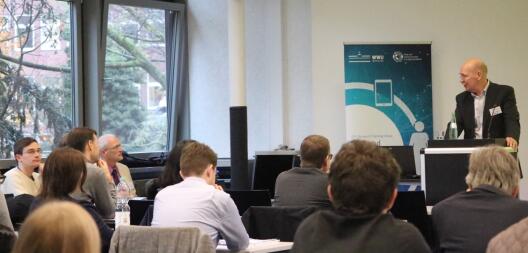Trust and technologies in global contexts
This year researchers already met for the fourth time in Münster to discuss current issues in trust research as part of the Late Autumn School. Under the title “Trust through the changes of time? The constitution and meaning of trust in digital times” the Research Training Group “Trust and Communication in a digitized World” had invited some of the most profiled actors in the field of trust research as keynote speakers. Moreover, the Late Autumn School offered PhD students in the fields of communication sciences, psychology, sports sciences, information systems and economics an opportunity to discuss their research projects with the renowned guests.
Keynotes
On Friday, 24th November, Prof. Dr. Roger C. Mayer from North Carolina State University (USA) started the keynote lectures with a talk on “Trust in a Digital Age: Getting beyond 1s & 0s”. As the first author and co-developer of one of the most cited trust models, Mayer is one of the most central actors in trust research. His model has not only been cited thousands of times, it also is a constitutive element in the research programme of the Research Training Group at the WWU Münster. In his keynote Mayer referred to his family history and specifically to the biographies of his ancestors in order to demonstrate the rapidness of current societal and technological transformations. He formulated the hypothesis that technological transformations would be happening faster and faster and would consequently result in ever-greater levels of risk. Trust would, one the one side, be a possibility to react towards these risks. On the other side, Mayer warned against trusting modern computer-based applications too much. Instead, he stressed extensively the need for critical thinking and fundamental knowledge. In place of blind trust, he concluded, it would be necessary to always critically question modern technologies.
Prof. Dr. Sirkka Jarvenpaa from the University of Texas at Austin (USA) is working at the intersection between economics and psychology. On Saturday morning in her keynote “Trust and Distrust in Hybrid and Blended Environments” she focused on the cooperation of global teams in working contexts. She specifically highlighted that most teams today are not exclusively virtual or face-to-face, but often a combination of both. In other words, most teams have a hybrid character. In this context she presented current insights from her research on global teams. One focus in her presentation was the relation between trust and distrust. Her research demonstrated that distrust can have positive effects in global teams.
Directly afterwards Prof. Dr. Yariv Tsfati discussed under the title “Should we trust trust?” the boundaries of what can be labelled trust research. The communication scientist, who is based at the University of Haifa, presented his research on the role of distrust in journalistic offerings for processes of political opinion formation. He concluded: “Seeing is not necessarily believing”. Audiences of TV programmes would for instance watch TV news of the opposing political camp, even though they do not necessarily trust these formats. Tsfati finished his talk by highlighting how important it is in a democracy that citizens trust journalism with its controlling function – at least to some extent.
Workshops
Both on Friday and Saturday the focus was put on the participating PhD students and their research projects. In the workshop led by Sirkka Jarvenpaa participants were offered the opportunity to present and discuss their research proposals. Prof. Jarvenpaa’s vast expertise was beneficial to everyone. With her critical interrogations she supported all participating PhD students with highly constructive suggestions.
In his workshop “Understanding Trust in a Digital Age” Roger Mayer discussed his “'Integrative Model of Organizational Trust” which he had developed with colleagues David Schoorman and James Davis already in 1995. Furthermore, he presented studies from the management field, where the model had been applied. One of the central insights from these studies were, that trust on the side of employees can be effectively triggered when their superiors tend to praise them and their work: “And it doesn't cost a thing,“ Mayer concluded.
Yariv Tsfati picked up the difficult polarized political situation in his home country Israel as part of his workshop. He specifically presented two research projects in which he had analysed the relation between consuming right-wing oriented media, media trust and political decision making by citizens in election times. His studies demonstrate that if influential conservative politicians criticize media, this might influence their success in elections positively.
The extensive programme was further complemented by a workshop on publication strategies in trust research. Prof. Dr. Guido Möllering from the Unversity of Witten-Herdecke and editor of the “Journal of Trust Research” provided all participating PhD students with helpful insights and advice on how to publish in the very interdisciplinary field of trust research.
About the Late Autumn School
Since 2013 Phd students at the Research Training Group have organised the interdisciplinary Late Autumn School. All PhD students from the Research Training Group as well as external participants are invited to gain a broader perspective on their projects and current issues in trust research during the three-day event. Next to the keynote speeches, participants can present and discuss their projects during intensive workshop sessions.
Photos









